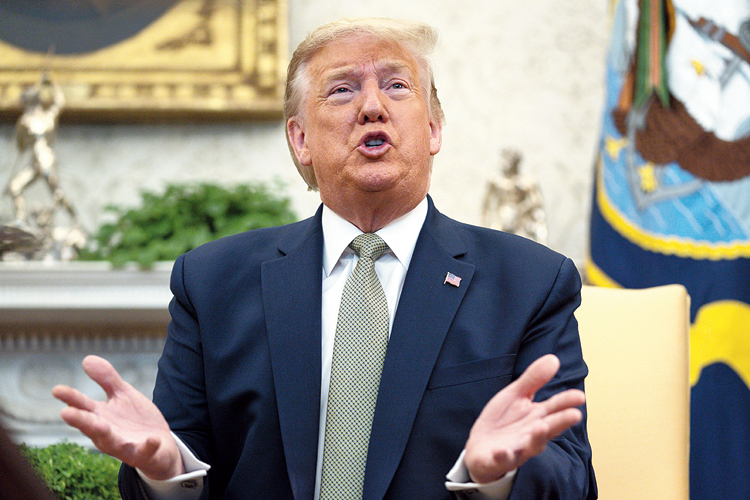Sir — As the Covid-19-related death toll neared a staggering 1,00,000 in the United States of America, The New York Times dedicated the Sunday paper to those who lost their lives to the pandemic. This is a fraction of the actual number, as many died at home or were excluded for several reasons. It is difficult to fathom why the president, Donald Trump, is still pushing for reopening the US economy. Many could have been saved had people taken precautions. But when the administration is unwilling to impose and maintain important restrictions, what hope is there for the vulnerable to survive?
Priyamvada Mallick,
New York
Deep trouble
Sir — In the article, “The darkest hour” (May 23), Ramachandra Guha has meticulously identified six distinct crises in India arising out of the Covid-19 pandemic. These are medical, economic, humanitarian and psychological crises, the weakening of Indian federalism and, finally, the dismantling of democracy. However, his practical suggestions to the government to recognize the dimensions of the problem, to consult leaders of the Opposition, to rely on the expertise of economists, scientists and public health experts and to refrain from harassing states not ruled by the Bharatiya Janata Party, are all bound to fall on deaf ears.
The humanitarian crisis caused by the sudden implementation of the lockdown has been the worst. Had the government imposed the lockdown in a planned and efficient manner, much of these problems could have been avoided. Up until the period immediately preceding the lockdown, the BJP had been more concerned about capturing political power than focusing on battling the pandemic. The World Health Organization had declared the novel coronavirus as a public health emergency as early as January 30 and a pandemic as of March 11. The government had ample time to prepare for the lockdown, which was finally announced on March 24. The Centre need not have announced the lockdown just four hours before putting it in place. Now that migrant workers have been allowed to travel back home, there is the ominous possibility of a greater spread of the disease.
India could have prepared itself better to meet the challenges of Covid-19. However, the last two crises that Guha mentions started much earlier, with the beginning of the BJP’s reign at the Centre.
Jahar Saha,
Calcutta
Sir — While the article by Ramachandra Guha has brilliantly outlined six distinct crises being faced by the country battling the coronavirus pandemic, the last two points analysing the weakening of Indian federalism and democracy discredit the handling of the outbreak by the prime minister. Narendra Modi has been lauded globally for his fight against the coronavirus. This is perhaps the greatest challenge that the country has faced since Independence, and Modi is hopeful that the countrymen can overcome this situation through wisdom, self-reliance and compassion.
Birkha Khadka Duvarseli,
Siliguri
Sir — The pandemic and the crises arising out of the lockdown have blatantly exposed some of the cruel tendencies present in Indian society. The latter’s divisive mindset has been laid bare by the recent targeting of Muslims and people from the Northeast. Rather than showing gratitude to essential workers, people have vilified and attacked them. It is easy to see that much of the criticism levelled against the Bengal chief minister, Mamata Banerjee, by the Centre is driven by considerations of possible electoral gains in the upcoming assembly polls.
Ramachandra Guha has rightly pointed out that the Centre must refrain from harassing states that are not ruled by the BJP. At a time when migrant workers are dying in large numbers, the government cannot afford to engage in petty political squabbles. It should focus on easing the troubles of the poorest sections of the society.
It is worrying that when Covid-19-related deaths in India are over 4,000 in number and many have fallen prey to hunger and joblessness, the Centre is busy lauding itself over its handling of the pandemic. On the other hand, the financially secure are riding through the crisis by isolating themselves in a comfortable bubble. Guha has justly concluded that the only way to overcome this crisis is through a combination of compassion, resources and wisdom. But compassion is in short supply in this dark hour.
Kajal Chatterjee,
Calcutta

